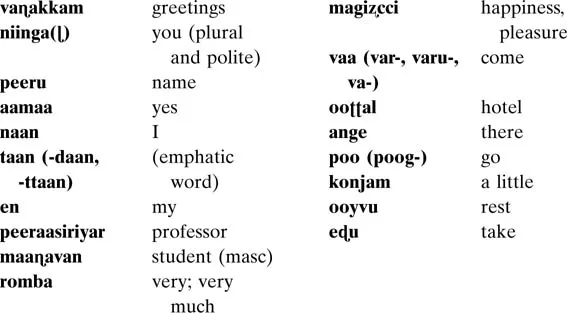
Colloquial Tamil
The Complete Course for Beginners
E. Annamalai, R.E. Asher
- 313 páginas
- English
- ePUB (apto para móviles)
- Disponible en iOS y Android
Colloquial Tamil
The Complete Course for Beginners
E. Annamalai, R.E. Asher
Información del libro
Colloquial Tamil is easy to use and completely up to date!
Specially written by experienced teachers for self-study or class use, the course offers a step-by-step approach to spoken Tamil. While emphasis is placed on colloquial spoken Tamil, you are given a useful introduction to formal speech and the written language as well.
What makes Colloquial Tamil your best choice in personal language learning?
-
- Emphasis on authentic conversational language
-
- Clear explanations on how to pronounce and write the language
-
- Helpful grammar notes and reference grammar
-
- Comprehensive vocabulary lists (Tamil-English and English-Tamil)
-
- Lively illustrations and fascinating cultural insights throughout
By the end of this rewarding course, you will be able to communicate confidently and effectively in Tamil in a broad range of everyday situations.
Audio material to accompany the course is available to download free in MP3 format from www.routledge.com/cw/colloquials. Recorded by native speakers, the audio material features the dialogues and texts from the book and will help develop your listening and pronunciation skills.
Preguntas frecuentes
Información
• | use simple greetings |
• | introduce yourself |
• | use personal pronouns |
• | use verb forms that are appropriate to the different pronouns |
• | ask questions |
• | make requests |
• | express politeness |


MURUGAN: | vanakkam. niinga Robert Smith-aa? |
SMITH: | aamaa. naandaan Robert Smith. vanakkam. |
MURUGAN: | en peeru Murugan. peeraasiriyar Madivaananoota maanavan. |
SMITH: | romba magizcci. |
MURUGAN: | vaanga, oottalukku poovoom. ange konjam ooyvu edunga. |
SMITH: | sari. vaanga, poovoom. |
MURUGAN: | Greetings. Are you Robert Smith? |
SMITH: | Yes. I am Robert Smith. Greetings. |
MURUGAN: | My name is Murugan. Professor Madhivanan’s student. |
SMITH: | Pleased to meet you. (lit. Much pleasure) |
MURUGAN: | Come. Let’s go to the hotel. You can rest up a bit. (lit. Take some rest there) |
SMITH: | Fine. Come, let’s go. |

1 | The intonation rises slightly at the end of the sentence when it is a question. |
2 | g between vowels is commonly pronounced h. |
3 | Vowels i and e in the beginning of a word are pronounced with a preceding y tinge (e.g. yedu). Vowels u and o in the beginning |
of a word have a w tinge (e.g. wonga). | |
4 | In a few phrases, n at the end of a word, when followed by a word beginning with p, is pronounced as m; e.g. en peeru is normally pronounced as em peeru (or even embeeru). |
5 | The word final u is not pronounced when followed by a vowel. |
